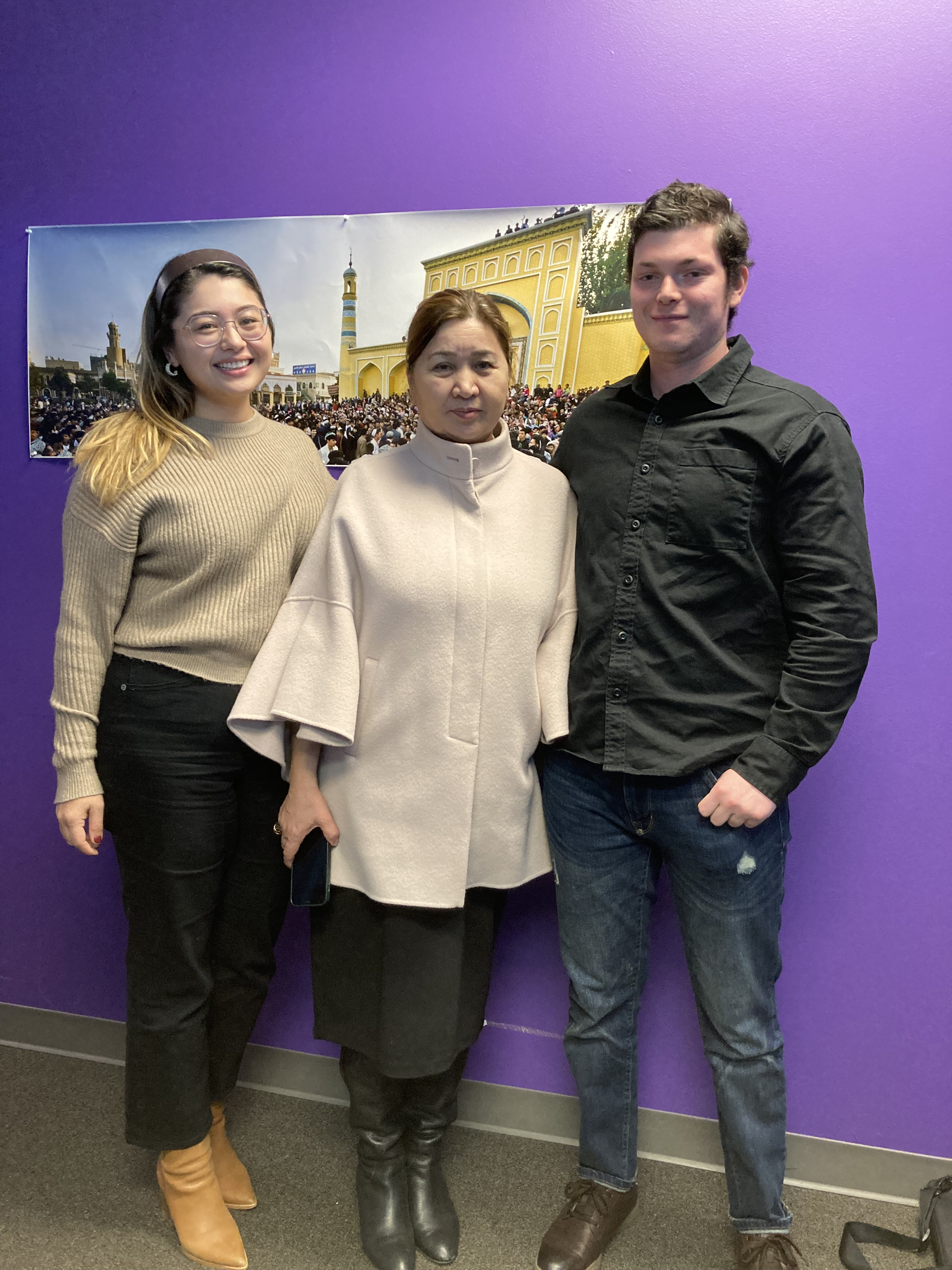
[Header image: Courtesy of Ana Care]
Photo taken inside Ana Care School with Irade Kashgary (on the left) and Surreya Kashgary (in the center) who are co-founders of the school [Image: Robert Kincaid]
Irade Kashgary and her mother, Surreya, opened Ana Care in 2017. Kashgary was born in China’s Xinjiang Uyghur Autonomous Region, and moved with her parents to the United States when she was a child to escape religious persecution. The small school offers language, culture and Islamic religious classes. Every Sunday, about 60 young Uyghurs come to Ana Care Education in northern Virginia to study their mother tongue.
The Xinjiang Uyghur Autonomous Region (XUAR) is currently home to about 12 million Uyghurs who are mostly Muslim. Since 2017, an estimated one million people, mostly Uyghurs, have been imprisoned by the Chinese government in the XUAR. Those who were not detained have suffered from intense surveillance, restrictions on religious observances, forced labor, and forced sterilizations. The United Nations Human Rights Office has stated that recent actions by the People's Republic of China could constitute crimes against humanity. The United States and several other foreign governments have described China’s actions in Xinjiang as genocide.
Bobby Kincaid, East-West Center Young Professional, had the opportunity to interview Surreya and Irade Kashgary, the mother and daughter co-founders of the Ana Care School.
Can you tell me a little about the Uyghur diaspora in Northern Virginia?
Northern Virginia has approximately 3,000 Uyghurs. Since 2016, families are coming from all over the world to join the large community in this region. Before Ana Care School was established, there was a concerning language gap between Uyghur parents and their young children, who had little formal training in the Uyghur language. Most children practiced the language at home, but not everyone could.
Your website says: “Since 1998, Uyghurs in Northern Virginia have gathered voluntarily to teach younger generations the language” Will you expand upon why these unofficial schools did not last very long, and why there is a newer emphasis on passing down the language and culture?
The reason previous schools did not last was because they were informal groups, with no permanent location and with very few committed students. Our school, for example, is from 11am-4pm on Sundays at a permanent location. We have a proper curriculum, starting with language, then dance, then religion and then soccer. This is the longest standing and most populated Uyghur school in the United States.
Before 2016, Uyghurs in America were not as dedicated to keeping the culture alive because they still had some contact with East Turkestan. But, as more and more Uyghur's flee persecution in China, schools are opening up in other cities We are forming a coalition of Uyghur schools in America to connect Uyghurs around the United States and to show unity and a commitment to keeping our traditions alive.
How is the Uyghur American Association (UAA) involved with Ana Care School?
The UAA was established in 1998. The UAA has consistently interacted with the Ana Care School. If Uyghurs in America need assistance with anything, the UAA will help them. If they are searching for jobs, if they need a driver's license, or if they need help with an asylum case, the UAA helps them. The UAA also collects testimonies of family members in Chinese “re-education” camps. However, Ana Care is a safe space that is independent from the UAA as some Uyghur’s are worried about becoming politically involved. Our mission is to maintain our cultural heritage and language.
How would you describe how Ana Care matters for US-Asia connections?
The Ana Care School is built on generational knowledge. We are building the next generation of people who may be the voices for Uyghurs. China is oppressing Uyghurs and eradicating Uyghur books and cultural artifacts in order to make sure the next generations cannot gain access to them. We are trying to teach this information and culture at the Ana Care school. Teens who attended Ana Care have gone to college for international relations, political science and law because they want to be an active part and a Uyghur voice within Asian politics. Ana Care school is helping them get there. There are many second- generation students who have never been home. Their classmates will go and visit their families during holidays but many teens at Ana Care school have no extended family to visit or anywhere to go because of the situation in Xinjiang. One of my goals is to keep the teen Uyghurs involved in their culture, language and arts.
Bobby Kincaid is a Research Intern at the East-West Center in Washington. He is a recent graduate from American University with a focus on China-Taiwan relations and Southeast Asia.